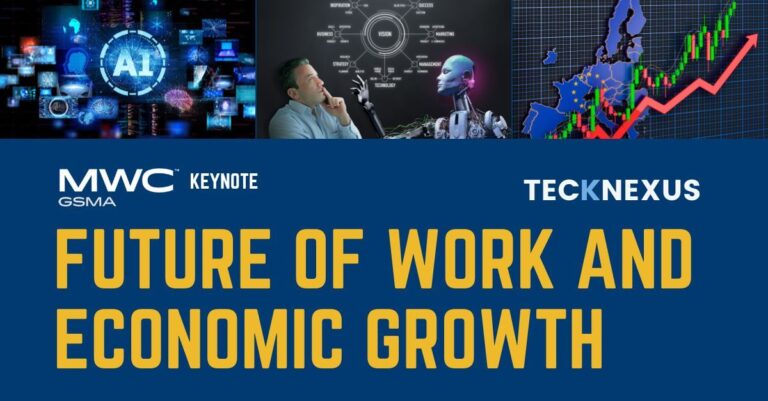The Mobile World Congress (MWC) 2025 has once again established itself as the premier global event for technology and innovation. Industry pioneers, startup founders, and thought leaders gathered to discuss the rapid evolution of AI, the global startup ecosystem, and Europe’s position in the tech landscape. From the rise of AI-powered industries to the challenges of scaling startups in a fragmented European market, this year’s discussions provided a deep dive into emerging trends, investment opportunities, and policy considerations shaping the future of technology.
Among the standout sessions was the “Fireside: Work in the Exponential Age,” where panelists explored how AI-driven transformations will reshape global labor markets over the next decade. As automation advances and AI takes on an increasingly central role in economic growth, companies must adapt to shifting skill demands. This discussion, featuring Euan Blair, CEO of Multiverse, and Saadia Zahidi, Managing Director at the World Economic Forum, tackled the impact of talent wars, evolving workforce dynamics, and strategies to future-proof employment markets. Moderated by Brendan Gaffey of McKinsey & Company, the session provided critical insights into the future of work.
Another key discussion, “How to Make Europe Grow (Again),” examined the current stagnation in Europe’s tech sector, addressing declining productivity, slow IPO markets, and widening gender and funding gaps. With the U.S. pulling ahead in the AI revolution, Europe risks losing its competitive edge. The panel, featuring Yoram Wijngaarde (CEO, Dealroom.co), Renate Nikolay (DG CONNECT, European Commission), Jordi Romero (Founder & CEO, Factorial), and Robert Lacher (Founding Partner, Visionaries Club), explored strategies to unlock Europe’s innovation potential and drive sustained economic growth. Moderated by Maija Palmer, Editor-in-Chief at Global Corporate Venturing, the discussion highlighted the urgent need for policy reforms, stronger investment ecosystems, and a more aggressive approach to scaling European startups on a global level.
This article summarizes key discussions from MWC 2025, providing actionable insights for investors, entrepreneurs, and tech professionals navigating the intersection of AI, workforce transformation, and economic policy.
MWC 2025 Insights: Workforce Trends & Economic Growth
This session of MWC 2025 showcased discussions on technology’s impact on the workforce, startup ecosystems, and economic growth. Experts explored how AI, globalization, and policy reforms are shaping the future of business. From the rise of AI-powered industries to the need for inclusive and scalable startup ecosystems, the event provided valuable insights for entrepreneurs, investors, and policymakers alike. Here are the most important takeaways from the discussions:
1. AI’s Role in Economic Growth: Why Europe Needs to Act Now
Artificial Intelligence (AI) is no longer a niche innovation—it is driving global economic growth.
AI’s Impact on Business Growth
- AI-driven automation is reshaping industries, particularly in B2B, HR, and logistics.
- AI startups are scaling faster than traditional SaaS companies.
- European startups are lagging behind the U.S. and China in AI model development.
The European AI Opportunity
- Europe may not lead in foundational AI models, but it can dominate in applied AI for industries like manufacturing, logistics, and procurement.
- The productivity gap between the U.S. and Europe can be reduced by integrating AI into existing industrial sectors.
Key Takeaway
AI isn’t just about models like ChatGPT—it’s about industrial transformation. European startups must focus on B2B AI applications rather than competing directly with U.S. tech giants.
2. Global Expansion: The New Rule for Startup Success
The era of regional expansion is over—successful startups today are born global.
New Startup Growth Strategies
- Five to ten years ago, companies expanded country by country. Now, startups target multiple global markets from day one.
- Remote hiring is critical—companies like Deal have fully remote teams worldwide.
- Top-tier talent is borderless, and companies should hire the best person for the job, regardless of location.
Key Takeaway
Scaling globally from the start is no longer optional—it’s a necessity. Startups must embrace global markets, remote hiring, and international expansion strategies to remain competitive.
3. How Europe’s Decentralized Tech Scene Fuels Innovation
A common criticism of the European tech ecosystem is its lack of a Silicon Valley-style hub. However, panelists argued that Europe’s decentralized nature can be an advantage.
Why Fragmentation Can Be Beneficial
- Europe has multiple centers of excellence (London for finance, Germany for quantum computing, Spain for AI startups).
- Cross-border expansion forces companies to think globally early on.
- Diversity of talent and industries creates unique opportunities.
Key Takeaway
Europe doesn’t need one central hub—it needs better integration. A stronger pan-European startup ecosystem can help businesses scale faster and innovate more efficiently.
4. Scaling vs. Selling: How European Startups Can Grow Bigger
Many European founders exit too early, often selling their companies for €100M instead of aiming for long-term unicorn status.
How Can European Startups Scale Further?
- Encourage later-stage funding—more competition in venture capital will push bigger investments.
- Incentivize long-term vision—founders need to build global brands, not quick exits.
- Increase startup formation—Europe needs more startups at the top of the funding funnel.
Key Takeaway
Scaling to unicorn status requires patience and larger investments. European founders need to think bigger and avoid selling early.
5. Diversity in Tech: Closing the Gender Gap in STEM and AI
STEM education is struggling to keep up with AI advancements, and traditional education models are failing to prepare women for leadership roles in tech.
Barriers Facing Women in Tech
- Lack of access to professional networks and mentorship.
- Systemic biases in hiring and leadership promotions.
- Traditional education models that don’t align with tech industry demands.
The Osaka Protocol: A Global Commitment to Inclusion
- A new global framework aims to drive gender diversity in AI, STEM, and emerging technologies.
- The protocol focuses on:
- STEM education for underrepresented groups.
- Closing the digital divide in emerging markets.
- Promoting ethical AI development.
Key Takeaway
Diverse teams generate higher profits—companies must prioritize inclusivity in hiring and leadership. The Osaka Protocol is a step towards gender equity in tech.
Strategic Takeaways for Entrepreneurs, Investors & Policymakers
For Startups & Entrepreneurs
✔️ Think global from day one—target international markets early.
✔️ Invest in AI-driven applications for B2B sectors.
✔️ Don’t sell too early—long-term vision leads to greater impact.
For Investors & Policymakers
✔️ Increase VC competition to drive larger investments.
✔️ Improve incentives for AI startups to retain top talent.
✔️ Support gender diversity in leadership—it leads to better business outcomes.
For Tech Professionals & Students
✔️ Develop AI skills—the demand for AI expertise is skyrocketing.
✔️ Seek global opportunities—remote work is the future.
✔️ Leverage professional networks for career growth.
Shaping the Future: AI, Globalization & Inclusive Growth
MWC 2024 reinforced a critical message: The future of tech is global, AI-driven, and inclusive.
- AI is the catalyst for the next industrial revolution—European companies must focus on applied AI rather than competing with U.S. giants.
- The global startup ecosystem is borderless—companies need to scale internationally from the start.
- Europe must change its mindset—instead of selling too early, startups should aim for long-term, world-class growth.
- Diversity in tech leadership is essential—initiatives like the Osaka Protocol aim to close the gender gap in AI and STEM.
Want to stay ahead of the latest tech trends? Subscribe to our newsletter and follow our MWC 2025 coverage for exclusive insights!
Session Moderators
Lara Dewar | GSMA, CMO
Maija Palmer | Global Corporate Venturing, Editor-in-chief
Session Speakers
Yoram Wijngaarde | Dealroom.co, CEO
Robert Lacher | Visionaries Club, Founding Partner
Euan Blair | Multiverse, CEO & Founder
Renate Nikolay | European Commission, DG CONNECT, Deputy Director-General
Ayumi Moore Aoki | WOMEN IN TECH GLOBAL, FOUNDER & CEO
Jordi Romero | Factorial, CEO
Rika Nakazawa | NTT, Chief Commercial Innovation




























